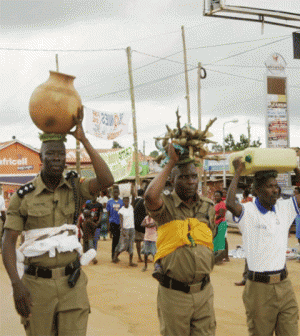- Finding Unshakable Power in a World That Wants to Pull Us ApartPosted 5 months ago
- What could a Donald Trump presidency mean for abortion rights?Posted 5 months ago
- Financial Empowerment: The Game-Changer for Women in Relationships and BeyondPosted 6 months ago
- Mental Health and Wellbeing Tips During and After PregnancyPosted 6 months ago
- Fall Renewal: Step outside your Comfort Zone & Experience Vibrant ChangePosted 6 months ago
- Women Entrepreneurs Need Support SystemsPosted 7 months ago
Male feminists inside Uganda's police strike out at killing of women

By Thomas Lewton | Thomson Reuters Foundation
“We want to put ourselves in the shoes of women”
KAMPALA, March 5 – Balancing a heavy clay pot on his head with a baby tied to his back, policeman Francis Ogweng caused a scene as he marched down the busy highway towards Uganda’s capital, Kampala.
With traffic backed up to the horizon, crowds of men stared and laughed as the baby girl swaddled in white cloth slipped precariously down Ogweng’s back, pulling his khaki uniform into disarray.
“We want to put ourselves in the shoes of women,” Ogweng, an assistant superintendent in the Uganda Police Force (UPF), told the Thomson Reuters Foundation. “Is it difficult to carry water? Is it difficult to carry a baby?”
Judging by the sweat dripping down his face, it is.
Onlookers were surprised to see a senior officer marching to stop violence against women, in a force that opponents of Uganda’s long-serving President Yoweri Museveni accuse of spending more time suppressing dissent than tackling crime.
Police often break up opposition rallies in the east African nation with teargas and beatings, rights groups say they torture suspects to illicit confessions, and surveys often rank the force as Uganda’s most corrupt institution.
“Their image has been tainted,” said Regina Bafaki, head of Action for Development, a local women’s rights group.
“They have actually been more violators than protectors of citizen’s rights.”
But a spate of unsolved murders of young women, with more than 20 corpses found beside roadsides south of the capital since May, is putting rare public pressure on the police.
They have charged more than a dozen suspects with the women’s murders, listing possible motives range from domestic rows through sexual abuse to ritual murder linked to human sacrifice.
BATTERING OF WOMEN
Ogweng was not alone, flanked by three policemen carrying bundles of firewood, a 50-strong police brass brand and other officers carrying placards that read: “Peace in the home. Peace in the nation. Prevent Gender Based Violence”.
“Men can also carry water, men can carry babies … it does no harm at all, it doesn’t make a man less of a man,” said Ogweng, who describes himself as a feminist – a rarity in a country where women often kneel to show deference to men.
About half of Ugandans believe that domestic violence is justified under certain circumstances, such as when women neglect children or burn food, government data shows.
“There are those who still believe that battering of women, beating of women, is something normal,” said Asan Kasingye, assistant inspector general, another unlikely ally in Uganda’s fight for gender equality.
“We must invest our resources, our training, our recruitment … into fighting against gender based violence,” he said, seated in his top floor office at the police headquarters.
“It must percolate, it must be known by everybody. So it preoccupies us.”
STRIPPED NAKED
The police demonstration calling for an end of violence against women went down well with locals around Entebbe, where about 20 women were raped and murdered in 2017.
“This government prides itself for bringing security … but at the same time when these ladies were being murdered, the government didn’t even talk about it,” said Anatoli Ndyabagyera, whose fiancee Rose Nakimuli was killed in July.
The murders illustrate a broader problem in Uganda, where government data shows more than one in three women suffer physical or sexual violence from an intimate partner, although few report it to the police.
“We have in our society a dangerous attitude of men thinking they can dispense with women and they can get away with it,” said Ndyabagyera. “They look at women and tend to think of them as items of ownership.”
Four in 10 girls wed before they turn 18, even though Uganda has banned child marriage, according to the United Nations children’s fund (UNICEF), and few go beyond primary school.
Efforts to pass a bill seeking to ban traditional practices, like dowry and the inheritance of widows by their husbands’ male relatives, and to grant rights to women in divorce have floundered for years.
Women wearing miniskirts were stripped by mobs of men following the 2014 Anti Pornography Act that banned “indecent” dressing and the police in 2015 stripped female opposition leader Zaina Fatuma naked in the street.
“There are (officers) who are badly behaved,” said Ogweng, who works in the child and family protection department.
“But there are those who are good, and there are many.”
Given the influential role of the police in Ugandan society, Ogweng believes he can help to change people’s perceptions about what it means to be a man.
“People are so rooted in the culture where some things are only done by women and some things are done by men,” he said.
“If a man, a police officer, can carry a baby, can carry a pot, then other men can do it … Men even called me afterwards and said: ‘You have opened my eyes’ … So I think people are beginning to understand.”
(Reporting by Thomas Lewton. Editing by Katy Migiro. Please credit the Thomson Reuters Foundation, the charitable arm of Thomson Reuters, that covers humanitarian news, women’s rights, trafficking, property rights, climate change and resilience. Visit http://news.trust.org to see more stories.)
Our Standards: The Thomson Reuters Trust Principles.






